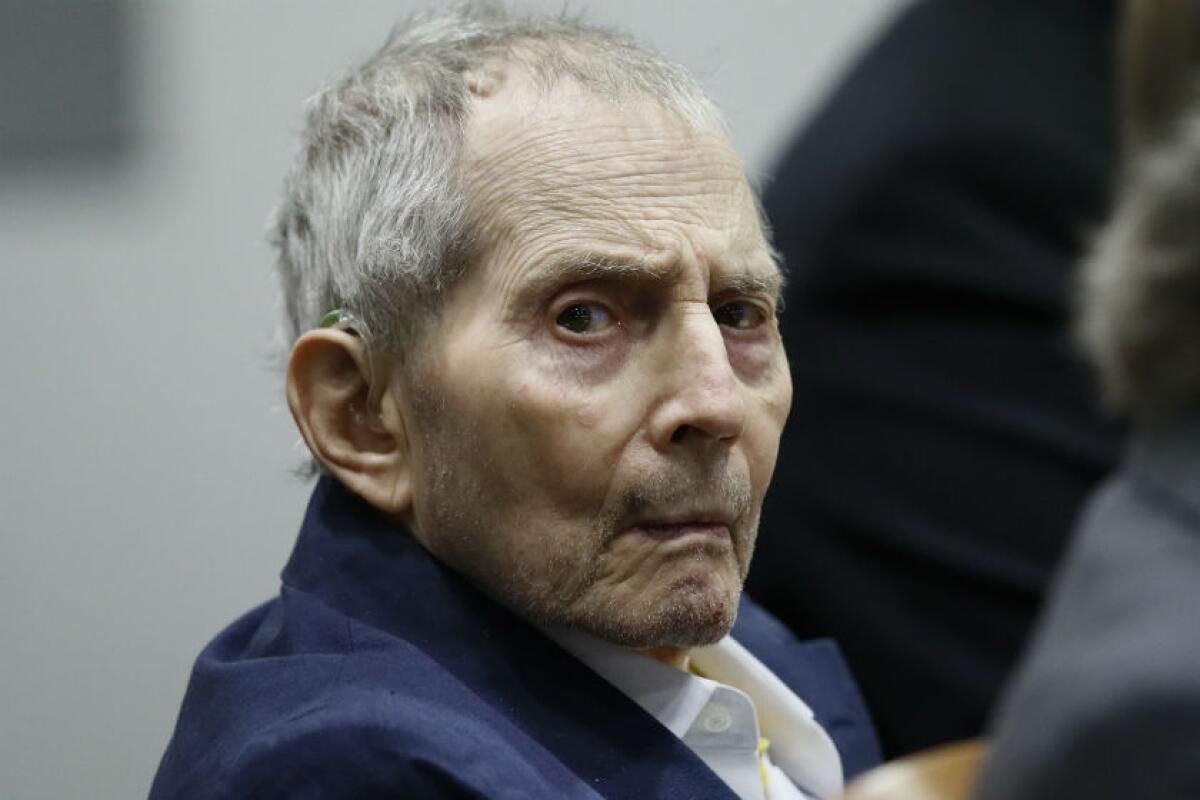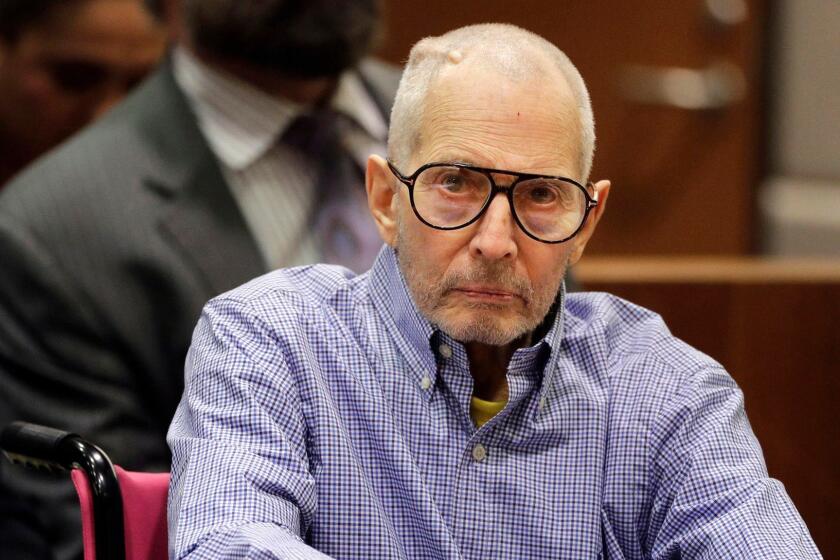The long-awaited murder trial of Robert Durst, subject of ‘The Jinx,’ begins unfolding in Los Angeles

It was shortly after noon on Christmas Eve in 2000 when a dispatcher in Los Angeles received the call: Dogs were barking outside a home along busy Benedict Canyon Drive. The tenant’s Isuzu was parked in the driveway, but the caller said the back door was wide open and the woman who lived there alone was not answering her phone.
“This case started off like many cases do, with a very innocuous call,” said Deputy Dist. Atty. John Lewin during the long-awaited opening statements in the murder trial of Robert Durst.
Police arrived and entered the shabby brown-shingled bungalow to find the writer Susan Berman dead on the hardwood floor, a pool of blood around her head. Lewin showed jurors photos of the scene, noting there was no apparent robbery or burglary. The windows were locked and unbroken. The doors showed no sign of forced entry. Nothing was removed or out of place. Even Berman’s purse, with her wallet inside, was tucked on the kitchen counter.
“The evidence is going to show, without question, that Susan knew her killer,” Lewin said. Berman, the daughter of mobster David Berman, was a paranoid woman not given to welcoming strangers. “She let her killer into the house, and she turned her back to him.”
Berman was killed with a gunshot to the head.
“Thankfully, she didn’t see it coming,” Lewin said.
Berman was Durst’s close friend and confidant dating back to their days together at UCLA, and nearly 20 years after her body was found, Durst is on trial for her killing.
The eccentric millionaire, now 76, was charged in 2015 when the HBO docuseries “The Jinx: The Life and Deaths of Robert Durst” catapulted him to wider notoriety by exploring the 1982 disappearance of his wife, the death of Berman and Durst’s acquittal in 2003 on a murder charge in Galveston, Texas. Los Angeles police arrested him in connection with Berman’s death on the eve of the finale of “The Jinx,” claiming he was a flight risk, and Durst has been held in custody ever since.
On Wednesday, Lewin began laying out the extensive evidence he said would prove Durst killed Berman — a web of testimony that spans decades, features more than 100 witnesses, and relies on dozens of hours of video and reams of documents.
“Much of the most damaging evidence is going to come directly from Mr. Durst himself,” Lewin told jurors, referencing hours of interviews Durst gave to creators of “The Jinx” and the audio commentary he provided for “All Good Things,” a 2010 fictional movie loosely based on his life starring Ryan Gosling.
Jurors saw video of Durst admitting to using food stamps and shoplifting water bottles at the airport, despite his family’s enormous wealth. He discussed his genitals in front of his mother-in-law. He spoke of his lackadaisical approach to working at his family’s real estate company and warned his pregnant wife that if she kept the baby, he’d divorce her.
“Bob Durst is very honest about the fact that the rules don’t apply to him,” Lewin argued.
The video clips presented to jurors were not limited to Durst’s statements. Lewin also showed excerpts of witness testimony from earlier hearings that will be replayed during the trial.
Among those witnesses was close friend Nick Chavin, who had testified that over dinner in 2014, Durst said of Berman, “I had to. It was her or me” — words Chavin said he took to be a confession.
The stream of video clips prompted lead defense attorney Dick DeGuerin to remark derisively outside court, “I thought I was in a movie theater.”
In the prosecution’s telling, Berman’s death was merely the second in a sequence of Durst’s alleged killings. Lewin devoted much of his time Wednesday to Durst’s increasingly turbulent marriage to Kathleen McCormack Durst, and what preceded her disappearance in 1982.
“It was clearly spiraling downhill,” Lewin said, referring to allegations of domestic abuse. Yet Kathleen Durst still saw her husband, and Lewin said Durst killed her when the couple were at their vacation home outside New York City. Authorities in New York have never arrested anyone in the matter, but Lewin said he would prove at trial that Durst killed her yet claimed to authorities that she was missing.
Berman was central to the ruse, prosecutors say, alleging she gave Durst a “false alibi” by impersonating Kathleen Durst in a call to her medical school and ultimately giving police the impression that she was still alive.
The case grew cold until 1999, when Durst learned New York authorities had reopened it. Prosecutors say that prompted Durst to silence Berman forever.
Prosecutors allege that the 2001 shooting and dismemberment of Durst’s elderly neighbor Morris Black in Galveston marked “the violent climax of his nearly yearlong effort to conceal himself from New York authorities.”
With jury selection set to begin in Los Angeles on Wednesday, the Robert Durst murder trial is expected to last up to five months, pitting a lineup of elite Los Angeles County prosecutors against the high-end Houston legal team that helped Durst beat a murder charge in Texas in 2003.
Durst was acquitted in Black’s death after claiming self-defense.
Defense attorney Chip Lewis told The Times that despite a thorough investigation in New York, no one has ever been charged in Kathleen Durst’s disappearance. Further, defense attorneys argue that virtually no physical evidence ties Durst to Berman’s killing.
“Bob Durst did not kill Susan Berman and doesn’t know who did,” DeGuerin told The Times last year.
Five years after HBO’s ‘The Jinx,’ Durst will stand trial in the 2000 killing of Susan Berman at her Benedict Canyon home.
Durst’s defense’s will further cast doubt on whether Black, who died months after Berman, is relevant to the case. Lewis called evidence of Black’s gruesome killing and dismemberment an “emotional hijacking,” adding that it was “solely designed to predispose the jury to find Bob guilty of Susan Berman’s murder.”
It’s unclear whether Durst, who turns 77 next month, will take the witness stand as he did in Galveston.
Now ill and with limited mobility, Durst has risen at 4 a.m. in the county jail to attend jury selection and the trial.
In court, he has signaled defiance, fist-bumping attorneys and once raising both arms victoriously as he looked out to the audience.
More to Read
Sign up for Essential California
The most important California stories and recommendations in your inbox every morning.
You may occasionally receive promotional content from the Los Angeles Times.












